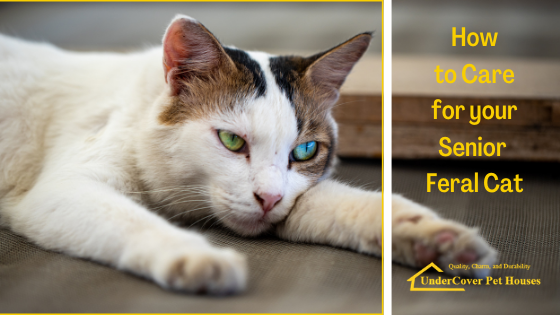 Loading... Please wait...
Loading... Please wait...Cat Care: Six Helpful Tips on Caring for Your Senior Feral Cat
Posted by Danny MacDonald on 2020 Dec 18th

The number of senior cats has been on the rise for years now, thanks to advances in veterinary care, better nutrition, and improved home care.
According to ASPCA, senior cats are aged between 12 and 14 years old. With more and more people having senior cats in their households, caring for senior cats has become an enormous concern. Like people, aging cats often face age-related issues, mainly due to gradual life changes, their lifestyle, and unhealthy habits. Cat owners must therefore observe extra care when dealing with senior cats.
To help you, below are tips helping your senior cat enjoy his/her golden years as comfortably and gracefully as possible.
1. Regular Veterinary Visits
Regular vet exams are vital in enhancing your older cat's well-being. The American Association of Feline Practitioners recommends that older cats be examined by a veterinarian every six months. Regular vet visits will help your veterinarian promptly identify any developing or underlying health issues resulting in easier disease management, a better quality of life, and cost-savings.
2. Keep an Eye on Your Senior Cat's Nutritional Needs
Fresh water and nutritious food are vital to cats of any age but may be particularly crucial for older cats. Senior cats are prone to dehydration, developing obesity, among other health issues, including diabetes, liver or kidney problems, and joint pain. Consult your vet on choosing a diet that provides appropriate nutrition and the required calories for your senior cat.
3. Provide Easy Access to Basic Needs
Older cats tend to have movement problems. To help them, have their accessories, including litter boxes and toys, within reach. It may even mean placing their accessories in more than one place. At times, you can also help your cat reach their accessories.
4. Keep Your Senior Cat Active and Comfortable
Keeping your senior cat active, stress-free, emotionally, and mentally stimulated can go a long way toward keeping her healthy. Find ways to spend quality time with your kitty, providing the love and care they need to be comfortable. You can take walks, engage in interactive play and exercises, among other activities.
5. Practice Good Grooming and Hygiene
As cats age, they tend to have reduced control over their overall hygiene and may need hands-on help with their hygiene. To help solve this problem, provide clean cat accessories and litter boxes. For long-haired cats, ensure that you regularly check and brush your cat's hair. Additionally, ensure that you regularly brush your cat's teeth. You can also ask your vet how you can go about home dental care between professional cleanings.
6. Try Keeping Your Senior Cat Inside at times
Although feral cats thrive on exploring the great outdoors, it's helpful to limit their outdoor time as they age. Rather than let them explore the great outdoors without supervision, you can build an enclosed backyard enriched with their favorite toys and cat essentials. If not, ensure your cat is equipped with safety gear when roaming outdoors.
Caring for your feline is a considerable responsibility that gets increasingly harder the older your cat gets. As your cat ages, their need for care and attention grows proportionally. Make your cat's environment as comfortable, fulfilling, accessible, and safe as possible. Above all, get your vet involved in your cat's life to ensure an improved quality of life as they get older.
